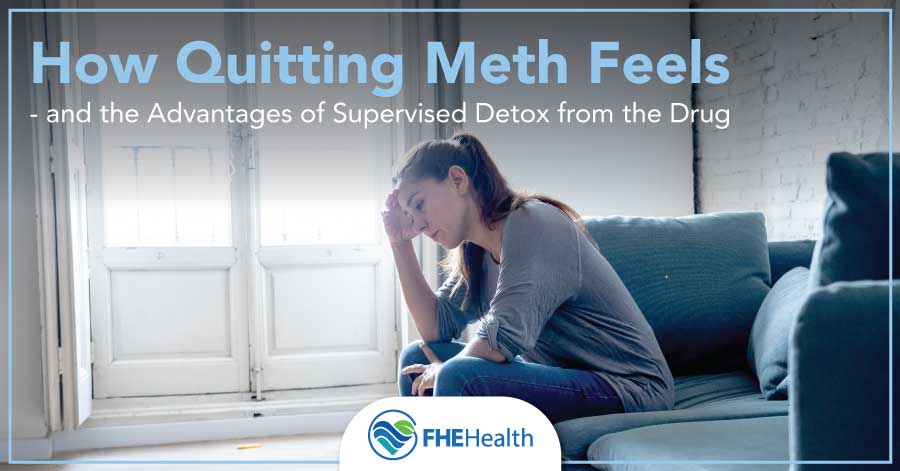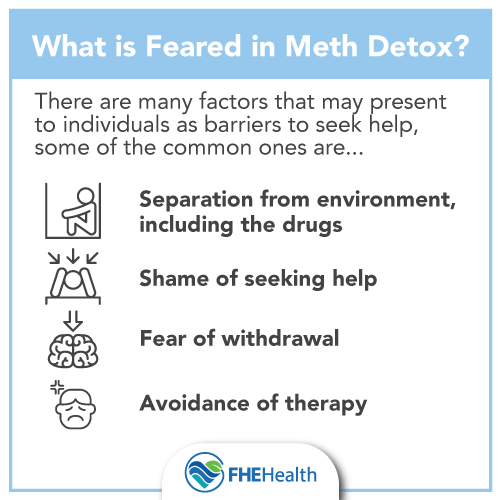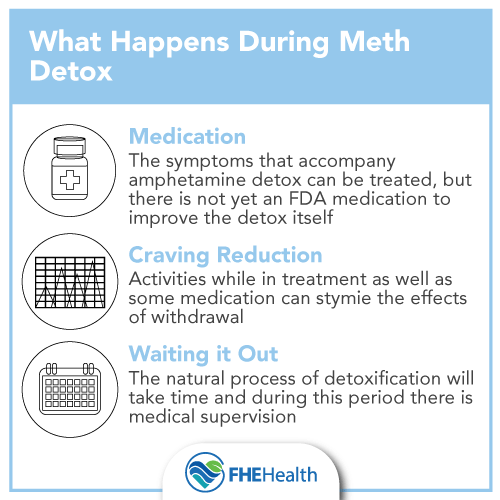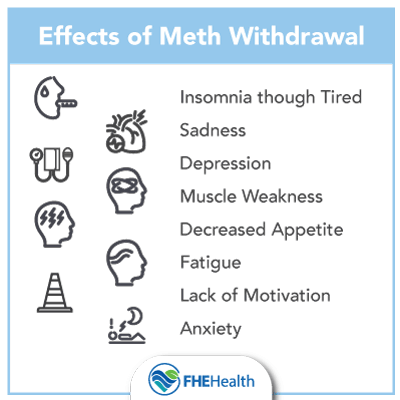
Life for a frequent meth user has more downsides than upsides. There’s the constant search for meth to satisfy the cravings and addiction. There’s also likely to be serious physical and psychological damage from nonstop meth use. Besides a devastating effect on the overall quality of life, for the addicted meth user, there’s a complete inability to function without meth. If this sounds familiar, it could be time to think about quitting meth.
Meth Addiction Is a Serious Problem and Thousands of People are Seeking Help
 In the United States, an estimated 1.6 million adults, on average, used methamphetamine each year from 2015-2018. About 25 percent of meth users injected meth. Also, nearly 50 percent of past-year meth users met the diagnostic criteria for methamphetamine use disorder. Besides the severe problem with meth addiction, co-occurring substance use and mental health disorders are prevalent and concerning.
In the United States, an estimated 1.6 million adults, on average, used methamphetamine each year from 2015-2018. About 25 percent of meth users injected meth. Also, nearly 50 percent of past-year meth users met the diagnostic criteria for methamphetamine use disorder. Besides the severe problem with meth addiction, co-occurring substance use and mental health disorders are prevalent and concerning.
Yet, despite the strong need and desire for help quitting meth, less than one-third of those with meth use disorder got treatment. This leaves many thousands of people seeking help in one form or another, often not knowing where to turn or what to do. Fortunately, there is help to end the devastating scourge of meth use and addiction.
Quitting Meth
Meth use can rapidly take over a person’s life. Instead of being a productive member of society, a meth user’s daily existence becomes a nonstop search for meth. This involves using meth, coming down from the drug, and getting a quick resupply. This vicious cycle repeats in a progressively downward spiral. The cycle continues unless and until there’s an intervention or the addicted individual decides that quitting meth is more important than continued use.
How to Quit Meth on Your Own
If you are looking for how to quit meth on your own, be prepared for some discouraging words. Quitting meth cold turkey is never recommended. The meth withdrawal process can be difficult, painful, and dangerous without professional medical supervision.
Signs of a Problem with Meth Addiction
 Frequent meth use can quickly turn into methamphetamine addiction. Yet the signs of a problem with meth addiction are not hard to see. In addition to many physical signs, meth addicts display several emotional and psychological symptoms of drug use.
Frequent meth use can quickly turn into methamphetamine addiction. Yet the signs of a problem with meth addiction are not hard to see. In addition to many physical signs, meth addicts display several emotional and psychological symptoms of drug use.
Common signs of regular meth use and addiction include:
- Tooth loss and decay – This is a condition known as “meth mouth.” Sometimes the tooth and gum damage is so severe that teeth break and fall out. The longer someone uses meth, the worse the damage to teeth.
- Violent behavior – Extreme aggression is associated with continued meth use.
- Open sores – Meth users regularly pick at sores caused by the chemicals contained in meth. These chemicals irritate the skin and contribute to incessant itching.
- Paranoia, delusions, hallucinations – The meth produces altered psychological states where the user sees, hears, and feels things that aren’t there.
- Extreme agitation, anxiety, and nervousness – These symptoms are caused primarily by meth, which acts as a central nervous system stimulant.
- Rapid and extreme weight loss – This condition is the result of the stimulant meth. But it’s more due to malnutrition, and other psychological factors, including stress.
- Inability to sleep – Insomnia is caused by the hyperstimulation of the central nervous system from meth.
- Rapid eye movements – These are visible effects of tweaking following a meth binge.
- Depression – Meth alters the brain’s balance of natural chemicals that control mood. Thus, constant use may lead to the development of mental health disorders such as depression and bipolar disorder.
Tips to Quit Meth
Once the decision to quit smoking meth is made, what’s next? While stopping the use of some drugs is easier than others, quitting any drug has its pitfalls. Caution is always advised when discontinuing any form of drug use, particularly highly addictive narcotics, and stimulants. What will everyday life be like after daily meth isn’t part of the routine? What will the effects on the body be like? How soon will some of the withdrawal symptoms go away? How will you deal with cravings and urges to use meth?
Withdrawal symptoms from meth, especially when quitting methamphetamine cold turkey, can be severe. The first phase of meth withdrawal, although it doesn’t typically last long, is the most difficult to endure. This is when some withdrawal symptoms such as extreme fatigue, hallucinations, depression, and some other mood disorders may occur. Because the withdrawal can be so uncomfortable, some meth users give up and go back to using.
That’s why making a sound plan for quitting meth is so important. First, establish the right mindset and know why you want to quit meth. Keep a positive attitude and move forward with the plan to get off meth use. In the meantime, the following tips may help in quitting meth.
1. Get Rid of the Meth.
When quitting meth, it’s important to eliminate the supply of the drug. There’s no sense in having meth around when the goal is to stop using and get off the vicious addiction cycle. This is especially true when someone is quitting meth cold turkey. Still, getting rid of meth needs to be done safely and appropriately. The best way to dispose of meth and other drugs is by mixing the powder with dirt or kitty litter. Then, place the mixed-up substance in triple plastic bags, and dump the bags in a garbage container, dumpster, or other bins specifically for garbage.
For meth users who inject the drug, it’s important to safely dispose of needles and syringes. Discard them in disposal boxes located in hospitals, public health facilities, and other safe needle disposal locations.
2. Steer Clear of the “People, Places, and Things” That Make You Want to Smoke Meth.
 Hanging out with other meth users is guaranteed to quash any effort to quit smoking meth. One of the best ways to be successful in overcoming meth addiction is to avoid people who are active meth users. Plus, stay away from the places and things most associated with using meth. This may not need to be forever, but it is important now. In the meantime, make new friends, ones who are sober and can help reinforce your goal of quitting meth.
Hanging out with other meth users is guaranteed to quash any effort to quit smoking meth. One of the best ways to be successful in overcoming meth addiction is to avoid people who are active meth users. Plus, stay away from the places and things most associated with using meth. This may not need to be forever, but it is important now. In the meantime, make new friends, ones who are sober and can help reinforce your goal of quitting meth.
3. Line Up a Strong Support System.
Quitting meth is a difficult endeavor. Many meth addicts give up the goal and give in to the overwhelming cravings for the drug their bodies and minds can’t escape. Ask loved ones, families, and friends to help serve as a support system. If they know that quitting meth is your primary goal, they’ll be staunch supporters and promise to be there when needed. This is crucial for anyone coming off meth, especially in the weeks and months after initially quitting.
4. Get Physically Active and Set Goals.
Physical exercise is scientifically proven to help recovering drug addicts regain their health. Exercise helps reduce drug cravings, one of the main causes of relapse. It’s not necessary to go from sedentary to a serious athlete to realize the benefits of physical activity. Start small and include some form of daily exercise. Taking a walk in the outdoors is an effortless way to incorporate physical activity into everyday routine.
Besides getting physical exercise regularly – something that will prove beneficial during and after meth withdrawal and treatment – be sure to set goals. Having things to look forward to will go a long way toward reinforcing the desire and commitment to being free from meth addiction.
5. Get Professional Help for Quitting Meth.
Meth is so addictive and self-destructive that quitting methamphetamine cold turkey is extremely dangerous. It’s also unlikely to prove successful. For long-term meth addicts, professional help is certainly the only safe and promising way of quitting meth. These individuals also suffer from serious physical and psychological damage resulting from drug use. Even for novice meth users, though, quitting meth cold turkey is not advised.
If you’ve tried quitting meth cold turkey and failed, getting outside professional help may be beneficial. Look for drug rehabilitation centers that specialize in medically assisted meth detox and treatment. These guarantee access to medical experts during the withdrawal process as meth leaves the body. It also means getting professional counseling and taking part in science-based behavioral treatment and therapies to overcome meth addiction.
At FHE Health, our caring and compassionate addiction specialists are always available. We’re here to answer your phone calls and respond to your online messages day and night, 365 days a year. Contact us to get started on the path to quitting meth and reclaiming a healthy, clean, and productive life.






